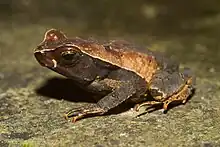| Rhaebo haematiticus | |
|---|---|
 | |
| Scientific classification | |
| Domain: | Eukaryota |
| Kingdom: | Animalia |
| Phylum: | Chordata |
| Class: | Amphibia |
| Order: | Anura |
| Family: | Bufonidae |
| Genus: | Rhaebo |
| Species: | R. haematiticus |
| Binomial name | |
| Rhaebo haematiticus (Cope, 1862) | |
| Synonyms | |
|
Bufo haematiticus Cope, 1862 | |
Rhaebo haematiticus (formerly Bufo haematiticus) is a species of toad in the family Bufonidae. It is found in eastern Honduras, Nicaragua, Costa Rica, Panama, Colombia, northwestern Venezuela (Serranía del Perijá), and northwestern Ecuador. Its altitudinal range is from sea level to 1,300 m (4,300 ft) asl.[1][2] Its natural habitats are primary tropical moist forest and submontane humid forest. It is a nocturnal, leaf-litter species that during the breeding seasons is found along small streams and large rivers. It tolerates some habitat degradation but only occurs close to forest. Threats to it are habitat loss caused by agriculture, wood extraction, and cattle ranching, and locally oil pollution and dams.[1]
References
- 1 2 3 IUCN SSC Amphibian Specialist Group (2020). "Rhaebo haematiticus". IUCN Red List of Threatened Species. 2020: e.T54660A3018008. doi:10.2305/IUCN.UK.2020-2.RLTS.T54660A3018008.en. Retrieved 15 November 2021.
- ↑ Frost, Darrel R. (2015). "Rhaebo haematiticus Cope, 1862". Amphibian Species of the World: an Online Reference. Version 6.0. American Museum of Natural History. Retrieved 17 September 2015.
This article is issued from Wikipedia. The text is licensed under Creative Commons - Attribution - Sharealike. Additional terms may apply for the media files.
